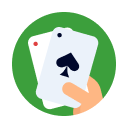vinylspiros
PIRANHA-------->< (((º>
Silver Level
I think i speak on behalf of the majority when i say. Im no math wizard. i know how many cards i need to win(outs) and more or less the basic formula to know the percentage of hitting those outs but MATH just AINT my thing. are good math people better at poker than others who just have gut feelins and play a certain style. should i take up a stastistics and math course to get better at my poker game? (lol) seriously: question of thread. are all poker pros mathematical geniuses? or not? can someone that doesnt love math do good at poker in the LONG RUN?
sometimes the numbers dont add up and ur call is a bad call but u feel like making it and ur right too. they will tel you,it was a bad call u got lucky and they may be right. example.what do you do when your gut says "call" but your math says "its an unprofitable longterm call"?
sometimes the numbers dont add up and ur call is a bad call but u feel like making it and ur right too. they will tel you,it was a bad call u got lucky and they may be right. example.what do you do when your gut says "call" but your math says "its an unprofitable longterm call"?
Last edited:








